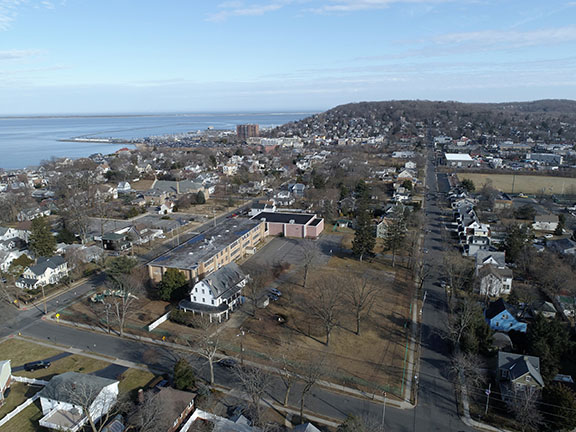ATLANTIC HIGHLANDS – In a densely populated town lately attracting even more new development and residents, town officials said there sits a rare opportunity to acquire parkland just three blocks from the prized harbor.
The Mother Teresa Regional School complex, formerly known as St. Agnes School, closed in 2016. It sits on 3.6 acres of land off South Avenue with the St. Agnes Thrift Shop.
While imagining what obtaining that parcel today could mean for future generations in Atlantic Highlands, town officials are weighing its price tag. Currently, the land owned by the Diocese of Trenton is assessed at more than $6.4 million.
“We want to get the opinion of the town after we fully flesh out this vision, so it’s looked at as the opportunity it is, rather than a burden. We don’t want to miss out on the opportunity,” said councilman James Murphy. His enthusiasm for a vision of green space encircled by a walking trail, park benches, a modern playground and a revenue-producing residential component is shared with borough administrator Adam Hubeny and council president Roy Dellosso. They have discussed the idea in recent executive sessions of the borough council.
Murphy said being proactive, rather than reactive, is in the town’s interest. “Just look at another situation in town with another large piece of land like the McConnell Tract,” Murphy said, referring to a citizen group’s current opposition to Denholtz Custom Homes plans to construct 18 luxury townhomes on an undeveloped Bayshore tract.
“The fight that residents are putting up for that land is seemingly, and unfortunately, a day late and a dollar short because the land is already under contract. In situations like this in town, it seems like the fight always happens too late. So if this St. Agnes property is a good opportunity for the town, and I personally feel that it is, we should do something now before it’s too late,” Murphy said.
The property sits adjacent to Avenue D with a school facility, gymnasium, two playgrounds, blacktop basketball and kickball courts and yards of green space between South Avenue and West Highland Avenue. It spans approximately two-thirds of those roadways.
The St. Agnes Thrift Shop, which was founded in 1969 inside a century-old, three-story colonial-style mansion, has a gated entryway on Avenue D.

Photo by Fred Yahn
A number of residential single-family homes that are not owned by the diocese cover the remaining third of the rectangular plot, several of which are set back from Avenue C.
As for the potential uses of this property, Hubeny said the governing body does not want to exclude any possibilities.
“Everything is on the table. Plans could include residential homes, to athletic fields, to a community recreation center, to simply having open green space. We could even rehabilitate the school on site. There are a lot of options to explore and it’s certainly a lot of opportunity.”
Hubeny added that the diocese is not interested in parting ways with the gymnasium.
Borough resident Bonnie Roberts said the notion of acquiring the parcel and developing it for community use is not a simple endeavor.
“If we’re using the half of the property for open green space and using the other half for something like senior housing, which is something the borough really needs, a project like this certainly makes sense. But ultimately it comes down to who is going pay for it all?” Roberts said.
Roberts resides near 21 Leonard Ave., a property that is owned by the borough and was included in Atlantic Highlands’ proposed affordable housing compliance plan amid controversy. The property once held a single-family home, but the proposed plan calls for a subdivision of the property that would include four affordable units.
She hopes any potential housing developments at the St. Agnes site could include affordable units, in hopes that it might alter plans for her neighborhood.
Murphy said if the borough was to move forward with the acquisition of the parcel, the council would need to forge a path that was least impactful to the public.
“The plot of land is big enough where you can break it up and have residences and public recreational space. It’s big enough where we can create a revenue source to offset the costs and the tax burden,” Murphy said.
Grants may help offset costs, though which grants would be available remains to be seen.














